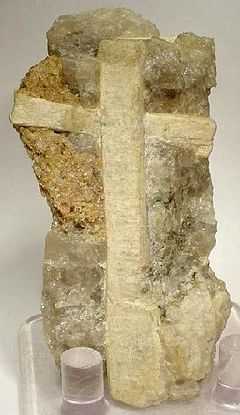Meionite
From Wikipedia, the free encyclopedia
| Meionite | |
|---|---|
 Meionite (scapolite) crystals (cross-shaped) in a quartz matrix, 7.2 x 4.0 x 3.0 cm. Worcester County, Massachusetts. | |
| General | |
| Category | Tectosilicate < br/>Scapolite group |
| Formula (repeating unit) | Ca4Al6Si6O24CO3 |
| Strunz classification | 09.FB.15 |
| Crystal symmetry | Tetragonal 4/m - Dipyramidal |
| Unit cell | a = 12.179(1)Å, c = 7.571(1)Å |
| Identification | |
| Color | Colorless, white, grey, pink, violet, blue, yellow, orange-brown, brown |
| Crystal system | Tetragonal |
| Cleavage | Distinct/good on {100}{110} |
| Fracture | Irregular/uneven, conchoidal |
| Tenacity | Brittle |
| Mohs scale hardness | 5 - 6 |
| Luster | Vitreous, resinous, pearly |
| Streak | White |
| Diaphaneity | Transparent, opaque |
| Specific gravity | 2.74 - 2.78 |
| References | [1][2][3] |
Meionite is a tectosilicate belonging to the scapolite group with the formula Ca4Al6Si6O24CO3. Some samples may also contain a sulfate group. It was first discovered in 1801 on Mt Somma, Vesuvius, Italy.
References
| Wikimedia Commons has media related to Meionite. |
This article is issued from Wikipedia. The text is available under the Creative Commons Attribution/Share Alike; additional terms may apply for the media files.